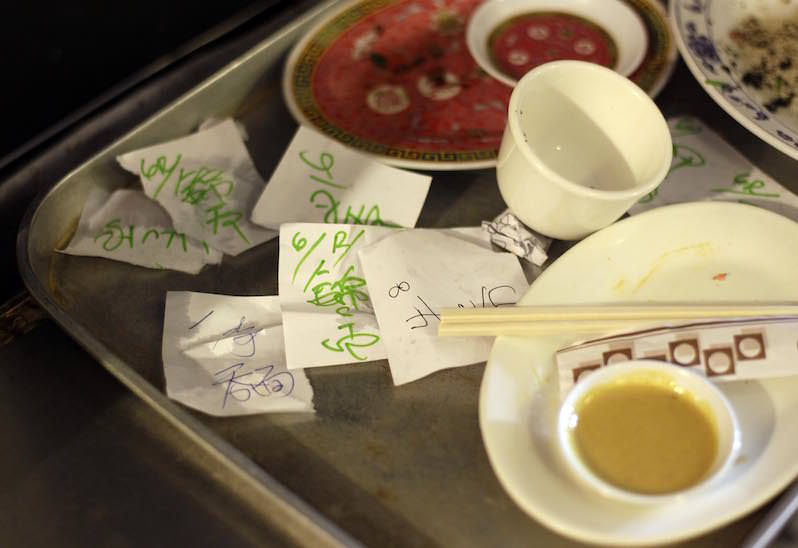The Secret Cost of Chinese Buffets: An Investigative Report, Part 2
Passing as an undocumented worker seeking employment through covert channels, the author is bused to Georgia, where she experiences the long hours and scant pay thousands of others endure around the country.
Eric Rosberg / AP
Editor’s note: This is the second article in a two-part series by the author about agencies that profit from exploiting the labor of undocumented immigrants. Read the first part of this investigative report here.
I call the number the agency gave me for the driver.
He gives me an address over the phone.
“What time is the bus?” I ask.
“Eight o’clock,” he answers. He hangs up.
I walk seven blocks from the employment agency to the address. I pass bubble-tea shops and restaurants with roasted ducks hanging from hooks in the windows. I stop in front of a building with a sign in a second-floor window that advertises the space as a temple. Below the temple is a grocery store that doubles as a bus agency. I go inside.
It is a small store that sells herbs, fermented bean curd and frozen chive dumplings. Customers pay for bus tickets and groceries at the same counter.
I show the cashier my employment-agency paper.
“I need a ticket to Georgia,” I say.
“$80,” she says.
I pay in cash. She hands me a bus ticket stub. The route is printed on the ticket: “New York to Baltimore, to South Carolina, to Atlanta.”
The discount buses in Chinatown go to more than 40 cities. They are notorious for long delays, breakdowns on the highway and fatal accidents caused by overworked drivers who fall asleep at the wheel. They are also widely believed to be linked to the Chinese mafia. Law enforcement officials have found buses carrying large quantities of cocaine and methamphetamines. Rivalries between competing bus companies can be deadly.
In 2002, a Chinatown bus driver named De Jian Chen backed into a competitor’s bus three times. He fractured the unlucky driver’s pelvis. A year later, Chen died from five bullet wounds to the chest.
The buses are also crawling with pimps who attempt to recruit Chinese women, headed for restaurant jobs around the country, into prostitution. The pimps frame the prostitution as massage-parlor work. They hand out business cards. The women usually do not call right away, but when they discover how little they can earn in the restaurants working 12-hour shifts, especially given the money they must turn over to the employment agencies and “snakeheads”—people who specialize in smuggling and human trafficking—it is hard not to succumb. For those who fall behind in their debts, the choice is often violence against them and their families, or being prostituted in a “massage parlor.” Many women in Chinese massage parlors started out working in Chinese restaurants.
There are only three Chinese passengers on the bus, including myself. The rest are African-American. The bus companies in Chinatown were originally formed in the early 1990s to transport undocumented Chinese workers to restaurant jobs across America. But eventually the cheap fares attracted non-Chinese passengers.
I drift in and out of sleep during the overnight trip. I wake around 1 p.m. We are passing billboards that advertise adult-film stores and restaurants. I am near the end of my 16-hour ride.
The bus arrives at the last stop in Atlanta. It’s August. I’m wearing a shirt I bought in Chinatown that says “Let It Snow,” in an effort to appear less Americanized. I feel a little ridiculous.
A Chinese woman waves at me. “You will be driven to a town an hour from here,” she says, motioning to a silver Audi. “It will cost you $50.”
She does not tell me the name of the restaurant or the town.
I get in the car. A taciturn Chinese man wearing dark sunglasses is behind the wheel. He is wearing jeans and a black T-shirt. We drive past Waffle House restaurants and discount department stores. We do not talk for the one-hour ride. He drops me off at a McDonald’s.
“Wait here,” he says. “Someone from the buffet will come pick you up.”
He leaves.
Outside McDonald’s, I sit on my suitcase. “Are you lost?” a man asks me. “I don’t see many Asians around here.”
“Someone is coming to pick me up. Thank you for asking, though,” I say. But I’ve never felt more lost. I don’t even know the name of the city.
I sit there for half an hour. A Chinese woman driving an SUV pulls into the parking lot. She is the buffet owner’s wife. I’ll call her Ellen. She is a thin, 45-year-old woman with sharp eyes and radiant skin. There is something severe about her face.
In the back seat are her two children, ages 5 and 11. They speak in a mixture of Chinese and English—Chinglish.
“I want McDonald’s,” one says.
“No, I want Wendy’s,” the other says.
“Be quiet!” Ellen snaps. A hush falls over the car.
“Did you come here on a student visa?” she asks.
“I used to go to school,” I say, hoping my vague but truthful answers will suffice. “School is very expensive.”
Ellen has been in the U.S. for more than two decades. She tells me she will teach me everything she knows about American society. She plays ’80s rock music and orders Chicken McNuggets at the drive-thru.
We drive for 20 minutes, passing shopping malls and Wal-Marts. We arrive at the workers’ dorm. It is a white, two-story house. The grass is overgrown and the paint is chipping. Two Chinese-restaurant owners use this house for their employees. She unlocks the door.
There is no living room or hallway on the ground floor. There are stairs going up and stairs going down.
“Don’t take your shoes off,” Ellen says. “The floors are very dirty.”
The beige carpet on the stairs is worn and soiled with brown stains. She leads me upstairs to a room containing only a lamp.
“This is your room,” she says.
I wonder if I’ll need to buy a bed. I go to the bathroom. Cockroaches scramble in the sink. I decide to wait until I get to the restaurant. I change into black clothing and leave with Ellen.
The buffet is a 10-minute drive from the dorm. We drive past well-kept suburban houses and a bike-rental shop.
The restaurant has a pagoda roof and red lanterns. It is in a small plaza filled with clothing stores and a pizzeria. A large banner says, “All You Can Eat Chinese Seafood For $7!”
I walk in the front door. The restaurant smells of soy sauce and Lysol. It offers the typical dishes found in cheap Chinese takeout places: egg drop soup, orange chicken and various meats fried and refried in soy sauce. There are also more expensive dishes, such as sushi, salmon, raw oysters, crawfish, mussels and shrimp with cocktail sauce.
Ellen walks directly to the back. She begins to scold a worker named John. He is a lanky, 19-year-old busboy with bushy sideburns and an expired student visa.
“I was at the dorm today. I saw your filthy room. How can you have your money scattered openly on the table like that?” she yells. “If your money gets stolen, I’m not going to compensate.”John laughs sheepishly. He scratches his sideburns. She hands him powdered vitamin packets for his ulcers.
John has ulcers on his tongue. He tells me later it’s from eating the same greasy, meat-heavy buffet food three times a day for the last two months. He usually has diarrhea around 11 in the morning, after eating a breakfast of leftovers from the night before.
“Follow John for the day,” Ellen says. “You won’t work, so you won’t get paid. This is training. I don’t care how much experience you have. Everyone is new when they are first hired at a restaurant.”
“I’ve been working 12-hour shifts for 15 days straight,” John tells me in a monotone.
“I’m so tired I feel like my legs are going to break,” he says, speaking in Mandarin. “I’m not even going to say ‘bye’ to those customers who are leaving. I’m so tired. I’m glad they finally hired someone so I can have a day off. Maybe the boss will take me to get a haircut.”
I follow him around. He refills people’s glasses of soda and sweet tea. We are the only two bussers for more than 100 customers.
We wipe tables and collect sticky dishes. John tells me his life story.
He left his home in Hebei province, a mountainous region in northern China, to study English at a San Diego university a year ago.
“I dropped out of college after six months,“ he says, standing next to a booth. “I’ve been here two months. I worked at a buffet in Canada for four months. I feel too ashamed to return to China with no degree and no money. I plan to save $40,000 in two years and start a business in China.”
“What kind of a business?” I ask.
“I don’t know,” he says.
John sees the world through money. He spends the next 10 minutes recalling how much customers tipped in the last two days and where they sat.
“The people who sat at this corner table yesterday left $2. An old couple who sat in the first booth left $2 this morning,” he says. “An obese woman who sat in the back on Saturday left nothing.”
When people first walk in, he tries to predict how much they will tip. He makes sure to tell me when he is right.
“I told you. This is all he tipped,” he says, waving a $1 bill after a party of four departs.
The bussers have no base salary. We only take home tips. Because it is a buffet, my interactions with customers are limited to refilling drinks and removing plates. We usually get $1 or $2 per table, or sometimes no tips at all. A generous tip is $5.
On weekdays, John usually makes $80. On a slow day, he makes as little as $60 for a 12-hour shift.
We seat customers. We clear plates and refill drinks. We enter the number of drinks ordered into the computer system and we print the bill. We give customers fortune cookies.
Work begins at 10 in the morning. It ends at 10 at night. There are no breaks. I start drinking four large Cokes a day. I usually do not drink soda.
The restaurant starts to empty around 9 p.m. The seafood and sushi trays are empty. John and I sit down for dinner at a table near the entrance, in case more people stroll in. He groans in pain as he eats. His ulcers sting.
“There is a pizza store across the street for when you get sick of buffet food,” John says. “But it costs $6. That’s several tables’ worth of money.”
I try to think of things to talk about that will divert him from asking about me.
“The Zika virus is spreading in Florida now,” I say.
“Haven’t heard of it,” he says. He is looking at his cellphone.
“It’s really scary. It’s a new virus in mosquitoes that causes birth defects and probably other illnesses too,” I say.
John nods, without taking his eyes off his phone.
There are six Latino workers in the kitchen and a cheerful, 21-year-old, Chinese-American host named Eric. Eric is the only one who doesn’t live in the dorm. He has a hint of a mustache and is always smiling. The other workers are scattered throughout the restaurant, all eating dinner alone. When strangers are forced to work and live together, they treasure solitude. I have the feeling that I’m bothering John by sitting with him.
We finish eating our greasy green beans, beef and egg drop soup after 10 minutes. We begin to clean up. I follow John as he shows me where the disinfectant sprays are stored. He gives the bathroom sink and toilet seat swift, cursory wipes. John scolds me when I start scraping some gray specks that have hardened on the sink.
“You are cleaning too much,” he says. ”It just has to look clean. Conserve your energy.”
After we finish washing the 3½-gallon sweet tea dispenser in the kitchen, Eric drives the eight of us to the dorm in the restaurant’s white van. There are two 50-pound bags of rice in the back of the van, but no seats. I am the only woman. The men offer me the passenger seat in front.
We drive past empty parking lots and unlit shopping centers. Eric shouts, “andele andele, muy caliente,” and other words he’s learned from pop culture. Everyone in the van laughs, except John, who is in a melancholy mood. John is blasting Chinese love songs from his cellphone.
I look back and see a picture of a pretty girl on his phone. I ask if it’s his girlfriend. He says no and is silent during the rest of the ride.
Eric brakes a little too hard when he stops at a gas station. Those seated on the bags of rice slide into each other. It is a nightly custom to stop at the gas station to buy alcohol before returning to the dorm. The Latinos get out to buy beer. John stays seated.
“The more money I save, the faster I can return to China,” he says.
“I drank with the Mexicans yesterday because I worked 13 days without a break,” he says in Mandarin. “That was a mistake. My ulcers exploded.”
Eric drops us off at the dorm.
“Hasta mañana!” he yells, pronouncing the “h” in the American way.
John and I live on the first floor, where there are three bedrooms. The six Latinos are squeezed in the basement with the washer and dryer. We go to our respective floors and stay there. It is 10:30 p.m.
The dorm’s living room also serves as a storage space for the restaurant. There are stacks of napkin boxes and several 50-pound rice bags. I open the refrigerator. It’s warm and smells like mold.The Latinos, drinking beer below us in the basement, blast mariachi music. I am suddenly very lonely. I want to ask John about his life in China. I want to ask him why he gave up on school. But he had been complaining all day about how painful it was to talk with tongue ulcers. I leave him alone. I walk into the bathroom and overcome my disgust and brush my teeth as the roaches dance below me in the sink.
After I shower, I come out of the bathroom and bump into the buffet owner. He is a stout man wearing a “Reagan Bush ’84” T-shirt. I wasn’t expecting anyone to stop by the house at 11 p.m. I’m wearing gym shorts, and he stares long and hard at my legs.
The owner is a morose man. I later find out he was smuggled into the U.S. He managed to pay off his debt and start two restaurants.
This is my first time meeting him. He does not ask my name or tell me his. He simply unlocks one of the bedroom doors.
“This is your room,” he says, and leaves.
My new room is a remarkable upgrade. It has a bed, a plastic shelf and a closet filled with broken hangers. There is an unplugged mini-fridge that has potential.
I later find out my old room is reserved for a 35-year-old woman named Cindy who is arriving the next day to work at another restaurant. When more employees come, we will have to share rooms. Many have to sleep on the floor.
I go downstairs to look at the washer and dryer. The Latino workers are lying on their beds, looking at their phones with forlorn expressions.
I’m hesitant to talk to the workers because I’m supposed to barely speak English. I manage to ask them where they’re from and how much they earn. They’re from Mexico and make $2,000 a month. They’ve been working in Chinese restaurants for four to six years.
At 9:40 a.m. the next day, we climb into the white van.
We hold our noses when we enter the restaurant’s kitchen through the back door. It smells like rotting food.
My morning routine consists of wiping windows and re-wiping tables. We brew sweet tea. We refill soy sauce containers once a week.
Breakfast is at 11 a.m.
I eat cantaloupe, and broccoli and green beans soaked in oil. It is also what I have for lunch and dinner. It’s usually the most nutritious items left in the buffet. I can eat it quickly. There’s salmon, but it’s old and steeped in old oil. It makes me queasy. There’s crawfish. Everything else is meat, rice and noodles.
There’s a lull in the afternoon. John and I go to the kitchen. We fill mushrooms with cheese and ground beef for 45 minutes. We are so tired we don’t talk to each other. John breaks the silence.
“The boss’s wife takes us to Wal-Mart every three weeks,” he says, his tone suggesting it is a treat.
The dinner guests start rolling in at 5 p.m. I am jealous of people having dinner with their families. I am jealous of people who have time to make plans with friends.
John and I sit down for dinner at 9:30 p.m. Three sets of customers stroll in. There’s an elderly couple, two friends and four construction workers.
“It’s the second time this has happened in two weeks,” John mutters about people coming in near closing time.
The kitchen goes into a frenzy to reheat and restock empty food trays. Another family comes in. The mother and daughter fill their plates with food. They sit down. The father announces there’s not enough food. He doesn’t want to wait. They leave without paying. The food shortage becomes a crisis.
I’m relieved to learn the two friends are only interested in eating crawfish. But the stern elderly man waves me over at 9:56 p.m. to inform me, “It’s not 10 o’clock yet, so bring out more oysters.”
“I’ll talk to the owner to see if that’s possible,” I say.
I expect the owner to say no, but he dashes to the freezer to get the oysters himself. It is 9:58 p.m. The kitchen workers are setting up equipment to steam oysters.
At 10:10 p.m., we tell the customers we can’t bring any more food out. They start to leave.
There is a frenzy of vacuuming, yelling, sweeping, running and pushing of carts. Eric turns off the lights. Workers yell at Eric to turn them back on.
I have been working for 13 hours. I am so exhausted I can’t think of Chinese words when John asks me what tasks I’ve completed. I start stammering in a mixture of English and Chinese. I wonder if I just blew my cover. John is too tired and flustered to notice my slips.
At 10:50 p.m., the owner says we can go. We drop everything and make a run for the van, our eyes adjusting to the darkness in the parking lot out back.
I made $110 for the 13 hours. Not bad. We stop at the gas station. No one gets out.
“No gas?” Eric says.
“No gas,” someone says. “Casa.”
“Why today no gas?” Eric says.
“No money,” someone says.
We go to the dorm. The air is thick with fatigue. The dorm is eerily quiet without the mariachi music. John struggles to stay awake as he plays games on the cracked screen of his cellphone. The Mexicans turn on the mariachi music.
“I regret coming to the U.S.,” John says. “I really do regret it.”
On my third night at the dorms, I decide I’ve seen enough. I arrange for a car service to pick me up early the next morning, before everyone leaves for work. I tell John I’m a reporter and I want to interview him about the underground Chinese-restaurant industry.
We stand in awkward silence in my room. He thinks it over. His eyes narrow.
“You’re very strange,” he finally says.
Then he shrugs. He tells me his story again—how he dropped out of college, how he needs to make money before returning to China, how he plans to start a business—a narrative I’ve heard a dozen times. I get the feeling that he’s so lonely he doesn’t care who he’s talking to.
At 6 a.m., I slip out of the house with my suitcase. One of the Mexican workers is standing in the driveway, talking on the phone with his family.
I wave goodbye to him as I get into the taxi. He waves back. I feel ashamed.
Amelia Pang is an award-winning journalist formerly with the Epoch Times.
Independent journalism is under threat and overshadowed by heavily funded mainstream media.
You can help level the playing field. Become a member.
Your tax-deductible contribution keeps us digging beneath the headlines to give you thought-provoking, investigative reporting and analysis that unearths what's really happening- without compromise.
Give today to support our courageous, independent journalists.






You need to be a supporter to comment.
There are currently no responses to this article.
Be the first to respond.